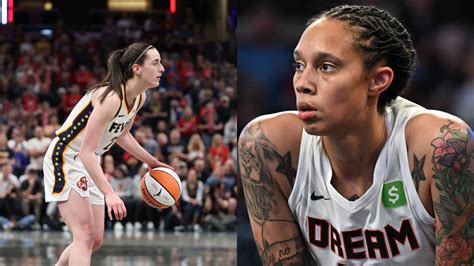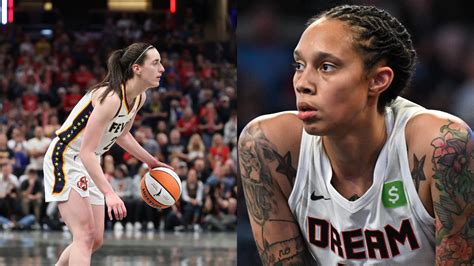
Brittney Griner has refuted allegations that she labeled Caitlin Clark with a “racist” slur amid ongoing discussions and debates among fans regarding Clark’s impact on women’s basketball, sparking a fresh wave of controversy.
Phoenix Mercury center Brittney Griner has publicly denied accusing Indiana Fever rookie Caitlin Clark of benefiting from racial privilege, despite a surge of online speculation and heated debates suggesting otherwise. The controversy erupted following Griner’s reflections on the increased visibility and financial opportunities surrounding women’s basketball, leading some observers to interpret her comments as critical of Clark and indicative of racial bias. Griner addressed the issue directly, stating unequivocally that she did not use any racial slurs or make accusations of racism against Clark, seeking to clarify her position and quell the escalating tensions within the sports community.
The initial spark for the controversy came from Griner’s discussion about the evolving landscape of women’s basketball, where she noted the unprecedented attention and resources now pouring into the sport, particularly since Clark’s entry into the WNBA. While Griner acknowledged Clark’s significant contributions to the game’s popularity, her broader commentary about disparities in media coverage and endorsement deals prompted some individuals to suggest that Griner was implying Clark’s success was disproportionately due to her race. These interpretations quickly spread across social media platforms, intensifying the debate and prompting calls for Griner to clarify her statements.
Griner responded through her representatives, issuing a statement emphasizing her respect for Clark’s talent and contributions to basketball. She explicitly denied making any racially charged remarks, asserting that her intention was to highlight systemic issues within the sports industry related to diversity, equity, and inclusion. Griner underscored the importance of recognizing the historical struggles faced by Black female athletes who have paved the way for current players and advocated for a more equitable distribution of opportunities across all racial backgrounds.
The denial from Griner has done little to completely quell the controversy, with many fans and commentators continuing to debate the nuances of her original statements and the broader implications for race relations within women’s basketball. The issue remains a sensitive and complex one, touching on themes of privilege, representation, and the ongoing fight for equality in sports.
Background and Context:
The controversy surrounding Griner’s remarks is rooted in a long history of racial disparities within women’s basketball and the broader sports landscape. For decades, Black female athletes have faced systemic barriers to recognition, endorsement deals, and media coverage, despite their significant contributions to the sport. The WNBA, in particular, has a predominantly Black player base, yet historically, marketing and promotional efforts have not always reflected this diversity.
Caitlin Clark’s arrival in the WNBA has brought unprecedented attention to the league, with record-breaking viewership numbers, sold-out arenas, and lucrative endorsement deals. While Clark’s talent and marketability are undeniable, some observers have raised concerns about the disproportionate focus on her, compared to other equally skilled or more experienced players, particularly those from underrepresented backgrounds. This disparity has fueled discussions about racial bias in media coverage and the broader sports industry.
Griner, as a prominent figure in the WNBA and an outspoken advocate for social justice, has often used her platform to address issues of race, gender, and equality. Her comments on the evolving landscape of women’s basketball were intended to spark a conversation about the need for greater inclusivity and equitable opportunities for all athletes, regardless of their race or background.
The Impact of Social Media:
Social media has played a significant role in amplifying the controversy surrounding Griner’s remarks. Initial interpretations of her statements quickly spread across platforms like Twitter, Instagram, and Facebook, often without the full context or nuance of her original message. This led to a flurry of online debates, with some users accusing Griner of racism and others defending her right to express her views on systemic issues within the sports industry.
The rapid dissemination of information and opinions on social media has made it challenging to control the narrative and ensure that discussions are based on accurate and complete information. In many cases, nuanced arguments are reduced to simplistic sound bites, and individuals are quickly labeled and judged based on limited information. This phenomenon has contributed to the polarization of opinions and the intensification of the controversy surrounding Griner’s remarks.
Statements and Reactions:
Following the initial uproar, several prominent figures in the sports world have weighed in on the controversy, offering their perspectives on the issues at hand. Some have defended Griner’s right to express her views on racial disparities in women’s basketball, while others have criticized her for allegedly singling out Clark or making comments that could be interpreted as racially insensitive.
WNBA players, coaches, and executives have also addressed the controversy, emphasizing the importance of promoting diversity, equity, and inclusion within the league. Many have acknowledged the historical challenges faced by Black female athletes and called for greater efforts to ensure that all players have equal opportunities to succeed.
Clark herself has remained largely silent on the issue, focusing instead on her performance on the court and her efforts to contribute to the success of the Indiana Fever. However, her agent has reportedly been in contact with WNBA officials to address concerns about the online harassment and negative attention directed at Clark as a result of the controversy.
Legal and Ethical Considerations:
The controversy surrounding Griner’s remarks also raises important legal and ethical considerations. While individuals have a right to express their views on matters of public concern, they must also be mindful of the potential impact of their words on others. Accusations of racism, in particular, can have serious consequences for both the accuser and the accused, and it is important to ensure that such claims are based on credible evidence and made in good faith.
In the context of professional sports, athletes and teams have a responsibility to promote a positive and inclusive environment for all participants. This includes taking steps to address issues of discrimination and bias, and to ensure that all athletes are treated with respect and dignity.
Moving Forward:
The controversy surrounding Griner’s remarks highlights the ongoing challenges of addressing issues of race, gender, and equality in sports. While there is no easy solution to these complex problems, it is essential to foster open and honest dialogue, to promote greater understanding and empathy, and to work collaboratively to create a more equitable and inclusive environment for all athletes.
This includes:
- Promoting diversity and inclusion at all levels of the sports industry: This includes ensuring that women and people of color are represented in leadership positions, coaching roles, and media coverage.
- Addressing systemic barriers to opportunity: This includes dismantling policies and practices that perpetuate discrimination and bias, and creating pathways for athletes from underrepresented backgrounds to succeed.
- Encouraging respectful dialogue and debate: This includes fostering a culture of open communication and critical thinking, where individuals can express their views without fear of reprisal, and where differing perspectives are valued and respected.
- Holding individuals accountable for their words and actions: This includes taking appropriate disciplinary action against those who engage in discriminatory or harassing behavior, and ensuring that victims of discrimination have access to resources and support.
- Continuing to educate and raise awareness: This includes providing training and education on issues of race, gender, and equality, and using the platform of sports to promote social justice and positive change.
The controversy surrounding Griner’s remarks serves as a reminder of the importance of these efforts, and of the ongoing need to address issues of race, gender, and equality in sports. By working together, athletes, teams, and fans can create a more inclusive and equitable environment for all.
Expanded Analysis:
To further understand the situation, it’s crucial to analyze the context and the undertones of the debate. The controversy isn’t solely about whether Griner used a specific slur; it’s about the larger conversation regarding privilege, representation, and the acknowledgment of systemic biases within the WNBA and women’s sports in general.
The WNBA has historically been a league dominated by Black athletes, yet the mainstream attention and marketing dollars have not always reflected this demographic reality. This has led to a sense of frustration among some players and fans who feel that Black athletes have been overlooked in favor of promoting white athletes, even when their on-court performance or contributions to the league are comparable.
Caitlin Clark’s arrival has undeniably brought a surge of popularity to the WNBA, attracting new fans and generating unprecedented media coverage. While this is undoubtedly positive for the league as a whole, it has also raised questions about whether Clark’s race plays a role in the level of attention she receives. Some argue that her appeal to a broader, whiter audience has made her more marketable and attractive to sponsors, while others maintain that her success is solely based on her exceptional talent and skill.
Griner’s comments, regardless of her intent, tapped into this existing tension and sparked a debate about the complexities of race, privilege, and representation in sports. It’s important to recognize that these issues are not always black and white (no pun intended) and that there are multiple perspectives and experiences that need to be considered.
The Role of Media and Public Perception:
The media plays a crucial role in shaping public perception of athletes and sports-related controversies. The way in which Griner’s comments were framed and disseminated by various media outlets undoubtedly influenced the public’s reaction. Some outlets may have sensationalized the issue to generate clicks and views, while others may have attempted to provide a more nuanced and balanced perspective.
It’s also important to consider the role of social media in amplifying the controversy. Social media platforms allow individuals to express their opinions and share information quickly and easily, but they can also be breeding grounds for misinformation, personal attacks, and online harassment. In the case of Griner’s comments, social media undoubtedly contributed to the polarization of opinions and the intensification of the debate.
Moving beyond immediate reactions, there should be a more profound analysis of the structural issues that create such controversies. The WNBA should proactively address concerns regarding equitable marketing and promotion of all its athletes. This might include initiatives to highlight the diverse backgrounds and stories of its players, investing in marketing campaigns that target different demographics, and ensuring that endorsement opportunities are distributed fairly.
The league should also engage in ongoing dialogue with players, coaches, and fans about issues of race, gender, and equality. This dialogue should be facilitated by experts in diversity and inclusion and should aim to promote greater understanding and empathy.
Lessons Learned:
The Griner-Clark controversy offers several important lessons for the sports industry and society as a whole. These include:
- The importance of clear and accurate communication: Athletes and public figures need to be mindful of the potential impact of their words and to communicate their views in a clear and accurate manner.
- The need for critical thinking and media literacy: Individuals need to be able to critically evaluate information and to distinguish between facts and opinions.
- The value of empathy and understanding: It’s important to approach discussions about race, gender, and equality with empathy and a willingness to understand different perspectives.
- The responsibility of media to provide fair and balanced coverage: Media outlets need to be mindful of their role in shaping public perception and to provide fair and balanced coverage of sports-related controversies.
- The importance of addressing systemic issues: Addressing the root causes of racial and gender disparities requires systemic changes and a commitment to creating a more equitable and inclusive society.
The Griner-Clark controversy is a complex and multifaceted issue that reflects the ongoing challenges of addressing race, gender, and equality in sports. By learning from this experience and by working together, athletes, teams, and fans can create a more inclusive and equitable environment for all.
The Current State of Affairs:
As of the latest reports, the situation remains tense, with ongoing discussions and debates taking place both online and in traditional media outlets. While Griner has explicitly denied making any racist remarks, the controversy has undoubtedly left a mark on her reputation and on the broader conversation about race and gender in women’s basketball.
It’s unclear what, if any, long-term consequences the controversy will have for Griner, Clark, or the WNBA. However, it’s likely that the issue will continue to be a topic of discussion for some time to come, and that it will serve as a reminder of the importance of addressing issues of race, gender, and equality in sports.
The Griner-Clark situation is more than just a fleeting controversy; it is a microcosm of the larger societal issues surrounding race, representation, and equity. Addressing these issues requires a multifaceted approach that includes open dialogue, critical self-reflection, and a commitment to systemic change.
The Role of the WNBA:
The WNBA, as a league, has a critical role to play in navigating this complex landscape. It must demonstrate leadership in promoting diversity and inclusion, ensuring that all of its athletes are treated with respect and dignity, and addressing any instances of discrimination or bias.
This includes investing in programs and initiatives that support the development of Black athletes, promoting diverse voices and perspectives within the league, and engaging in ongoing dialogue with players, coaches, and fans about issues of race, gender, and equality.
It also requires holding individuals accountable for their words and actions and ensuring that those who engage in discriminatory or harassing behavior are subject to appropriate disciplinary measures.
By taking a proactive and comprehensive approach to addressing these issues, the WNBA can create a more inclusive and equitable environment for all of its athletes and fans.
Conclusion:
The controversy surrounding Brittney Griner’s alleged “racist” slur against Caitlin Clark, which she has vehemently denied, has ignited a significant firestorm within the sports community and beyond. This incident underscores the persistent complexities of race, representation, and equity in sports and society. While Griner’s denial aims to dispel the immediate accusations, the underlying tensions and debates surrounding privilege, opportunity, and media portrayal continue to simmer.
The narrative emphasizes the necessity for ongoing dialogue, critical self-reflection, and proactive measures to foster a more inclusive and equitable environment within the WNBA and the broader sports landscape. It highlights the crucial role of media in shaping public perception and the responsibility of athletes, teams, and fans to engage in respectful and constructive conversations.
Moving forward, it is imperative for the WNBA and its stakeholders to prioritize diversity, equity, and inclusion at all levels, ensuring that all athletes are afforded equal opportunities and that their voices are heard and valued. By addressing systemic issues, promoting understanding, and holding individuals accountable, the sports community can strive towards a more just and equitable future.
The controversy surrounding Griner’s alleged remarks should serve as a catalyst for meaningful change and a renewed commitment to promoting equality and social justice in sports. It is through continuous effort, open dialogue, and unwavering dedication that we can foster a more inclusive and equitable environment for all athletes and fans.
Frequently Asked Questions (FAQ)
1. Did Brittney Griner actually call Caitlin Clark a racist slur?
No, Brittney Griner has explicitly denied using any racist slurs or making any accusations of racism against Caitlin Clark. According to reports, Griner’s representatives issued a statement emphasizing her respect for Clark’s talent and contributions to basketball and clarifying that her intention was to highlight systemic issues within the sports industry related to diversity, equity, and inclusion.
2. What was the original context of Griner’s comments that led to the controversy?
The controversy stemmed from Griner’s reflections on the increased visibility and financial opportunities surrounding women’s basketball, particularly since Clark’s entry into the WNBA. While Griner acknowledged Clark’s contributions, her broader commentary about disparities in media coverage and endorsement deals prompted some individuals to interpret her comments as critical and indicative of racial bias.
3. How has social media impacted the controversy surrounding Griner’s remarks?
Social media has played a significant role in amplifying the controversy. Initial interpretations of Griner’s statements quickly spread across platforms, often without the full context of her original message. This led to online debates, with some accusing Griner of racism and others defending her right to express her views on systemic issues. The rapid dissemination of information and opinions has made it challenging to control the narrative and ensure discussions are based on accurate information.
4. What are some of the broader issues that this controversy highlights within women’s basketball?
The controversy underscores the complexities of race, representation, and equity in sports. It touches on themes of privilege, historical disparities in media coverage and endorsement deals for Black female athletes, and the need for greater inclusivity and equitable opportunities for all athletes, regardless of their race or background. It also reflects the ongoing struggle to address systemic biases and promote diversity at all levels of the sports industry.
5. What steps can the WNBA take to address the underlying issues highlighted by this controversy?
The WNBA can take several steps to address the underlying issues, including promoting diversity and inclusion at all levels, addressing systemic barriers to opportunity, encouraging respectful dialogue and debate, holding individuals accountable for their words and actions, and continuing to educate and raise awareness about issues of race, gender, and equality. These efforts should aim to create a more equitable and inclusive environment for all athletes and fans.









